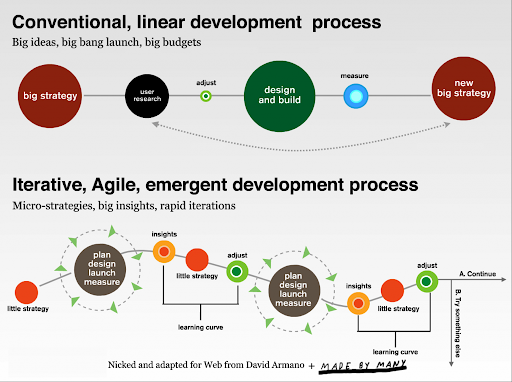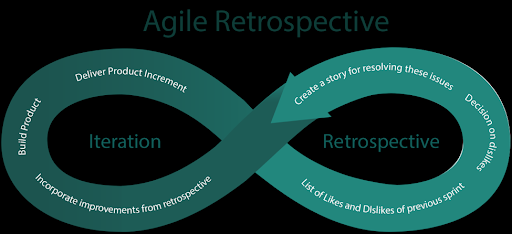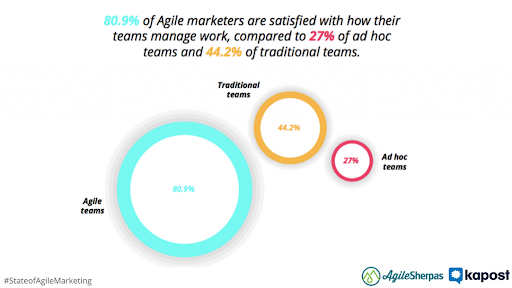Gone are the days of six-month marketing plans.
Today, the most successful marketers are agile, reaching their audience at the right time, with the right message, and on the most relevant channel. Marketing responsibilities and methodologies have changed drastically in the past decade, and brands can no longer afford to create an annual or half-yearly marketing plan.
In the ever-changing digital scenario, a single Google update can pull the carpet below your feet. While traditional marketing puts producers and their sales cycle at the center of the process, agile marketing considers the customers and their buying behavior.
 Source
Source
Understanding agile marketing
Inspired by agile software development, agile marketing functions based on these values:
- Responding to change over following a plan
- Rapid iterations over long-term campaigns
- Testing and data over assumptions and opinions
- Numerous small experiments over standalone bets
- Collaboration and transparency over silos and hierarchy
In agile marketing, teams apply their collective efforts to accomplish projects. The team members make use of a short, definite time period for project completion. They keep track of the results of their efforts and strive to iterate and improve over time.
 Source
Source
Features of agile marketing
Agile marketing is a process based on a few key features. The commonly known features and terms included in agile marketing are:
Sprints
Sprint refers to an amount of time given to the team for project completion. Generally, a sprint ranges from 15 days to six weeks. For larger projects, long sprints are grouped into several smaller sprints that can be easily managed.
Stand-up meetings
Each day the team gets together for around 15 minutes and has a brief check regarding the work assigned on the previous day and their plan for the day ahead. Any hiccups are resolved as soon as possible for the timely project completion.
A board to track project progress
Project management software tools like ActiveCollab and Trello have made it easy to maintain a record of each sprint. Alternatively, you can even use a whiteboard with sticky notes.

Teamwork
In closed teams, individual members get a chance to learn and improve their skills. A well-oiled team improves the completion rate and time. A project is transformed from personal wins to collaborative success.
Benefits of agile marketing
The goal of agile marketing is to increase transparency, speed, and adaptability of a campaign in the age of customer profile-based marketing. In both B2B and B2C industries, successful marketing leads to increased customer satisfaction and sales.
Within traditional marketing, it becomes difficult to change strategies based on marketing trends and changing customer needs. When marketers need to quickly pivot due to a poor click-through rate, customer backlash, or product recall, every second counts. This is where agile marketing comes to the rescue.
Here are eight ways agile marketing increases employee productivity, conversions, and ultimately, sales.
1. Enable better internal communications
One of the main reasons why businesses should opt for agile marketing is that it improves communication within the marketing team. Because of daily scrum meetings, everyone on the team knows what the other members are working on. Any challenge that a team member faces is immediately resolved.
2. Impart a competitive boost
Improving the productivity of marketing efforts and adopting a customer-centric method boosts the overall competitiveness of your business and increases customer satisfaction. The timely delivery of projects ensures faster time to market. This, in turn, drives better ROI with faster business growth.
3. Enhance productivity
Marketers who choose agile strategies experience increased productivity. That means more projects completed, user stories completed, points scored, and results. As every user story or marketing task warrants a different level of effort, teams assign points according to the amount of work required to complete the story. Some other productivity metrics to measure are visitors to a site, return visitors, bounce rate, trials, and sales. No matter what your goals are, agile marketing will enhance the productivity and velocity of your marketing team.
4. Mitigate marketing costs
Agile Marketing is a cost-effective solution to help businesses yield long-term results from their marketing efforts. Companies can efficiently and effectively increase their reach to a larger audience through work ethic and organization without any exorbitant investment in multiple solutions.
5. Ensure employee satisfaction
Agile marketers are more satisfied with their work management approach when compared to others, and happy marketers exhibit better productivity.

This is because agile marketers have the ability to better prioritize their tasks and accelerate the delivery of projects. Coordination with other teams is improved, and that ultimately boosts team morale. As everyone is aware of the jobs assigned to their colleagues, there’s also more project visibility. Quality of work improves and employee satisfaction automatically shoots up, and vice versa.
6. Facilitate transparency
Agile marketing gives a clear insight into the projects delivered by your marketing department. Through sprint review meetings, management can share their feedback that eventually bring about better results. The marketing team can let management know about their tangible contributions and get their hard work acknowledged. Here, transparency is not just limited to the team. It also means that the marketing team works closely with the customers and offers honest services to them.
7. Allow accurate measurement of results
Measurement and accountability are the two main features of agile marketing. Agile marketing teams usually execute small tests to measure results accurately and determine what works and what doesn’t. Based on this information, they can then invest more time in the strategies that are working. Consequently, marketers can effectively communicate their contributions to management.
8. Make work fun
It is exciting to gather every day and talk about the project you are working on and let the team know about your challenges and achievements. Through stand-up meetings, you also get to know what your team members are working on. All of these practices contribute to building a cohesive team that is more empathetic and accountable—and one that has more fun. The self-managing nature of agile marketing is its greatest advantage.
Ready to adopt agile?
The importance of getting the right message in front of the right audience at the right time defines the success or failure of a campaign. Agile marketing methodologies enable teams to stay up to date with the trends and learn what the customers want in real-time. It allows marketers to get an idea or product in front of customers in a shorter period of time with a smaller budget and lesser risk, therefore propelling your business forward.
Get started with agile marketing today, and then check out over 50 innovative marketing resources to keep you at the top of your game and enhance your strategy – all free on G2.

 by Michael Bibla
by Michael Bibla
 by Julia McCoy
by Julia McCoy
 by Neelam Goswami
by Neelam Goswami